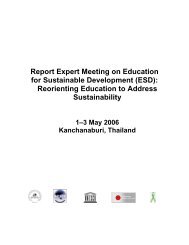Module 11 | Indigenous knowledge and sustainability - APCEIU
Module 11 | Indigenous knowledge and sustainability - APCEIU
Module 11 | Indigenous knowledge and sustainability - APCEIU
You also want an ePaper? Increase the reach of your titles
YUMPU automatically turns print PDFs into web optimized ePapers that Google loves.
Sri Lanka Centre for <strong>Indigenous</strong> Knowledge (1996) <strong>Indigenous</strong> Knowledge <strong>and</strong><br />
Sustainable Development, University of Sri Jayewardenapura, pp. vii-viii.<br />
Warren, D.M., Brokensha, D. <strong>and</strong> Slikkenveer, L.J. (eds) (1992) <strong>Indigenous</strong> Knowledge<br />
Systems: The Cultural Dimensions of Development, Kegan Paul International, London.<br />
Internet Sites<br />
<strong>Indigenous</strong> <strong>knowledge</strong> <strong>and</strong> practices vary greatly between countries <strong>and</strong> regions.<br />
Therefore, the activities <strong>and</strong> resources provided here need to be considered within the<br />
context of indigenous experiences in your part of the world.<br />
Useful sources of information include:<br />
Center for World <strong>Indigenous</strong> Studies<br />
CIRAN<br />
The Centre for International Research <strong>and</strong> Advisory Networks for <strong>Indigenous</strong><br />
Knowledge <strong>and</strong> Sustainable Development.<br />
The Earth Council <strong>Indigenous</strong> Peoples' Project<br />
<strong>Indigenous</strong> Education Worldwide<br />
This Internet site lists materials, contacts, links <strong>and</strong> other resources related to the:<br />
Ainu of Japan<br />
Aborigines of Australia<br />
First Nations of Canada<br />
<strong>Indigenous</strong> People of Russia<br />
Maori of New Zeal<strong>and</strong><br />
Native Hawaiians<br />
Native North Americans<br />
Saami of Sc<strong>and</strong>inavia<br />
Inuit<br />
<strong>Indigenous</strong> Knowledge <strong>and</strong> Development Monitor<br />
A journal published by CIRAN on the role that indigenous <strong>knowledge</strong> can play in<br />
sustainable development. The Monitor is published three times a year.<br />
UNESCO's (MOST) database of best practice on <strong>Indigenous</strong> Knowledge<br />
The Centre for International Research <strong>and</strong> Advisory Networks (CIRAN) in cooperation<br />
with UNESCO's Management of Social Transformations Programme<br />
(MOST) jointly coordinate a database of best practice on <strong>Indigenous</strong> Knowledge. This<br />
site includes a definition of indigenous <strong>knowledge</strong>, a discussion of criteria for<br />
selecting 'best practice', <strong>and</strong> a registry of best practice that gives numerous detailed<br />
summaries of projects in Africa, Asia, Europe <strong>and</strong> Latin America that have sought to<br />
improve conditions <strong>and</strong> alleviate poverty through the successful employment of<br />
indigenous <strong>knowledge</strong>s. The site also links to CIRAN <strong>and</strong> MOST's joint publication<br />
entitled Best Practices on <strong>Indigenous</strong> Knowledge.








